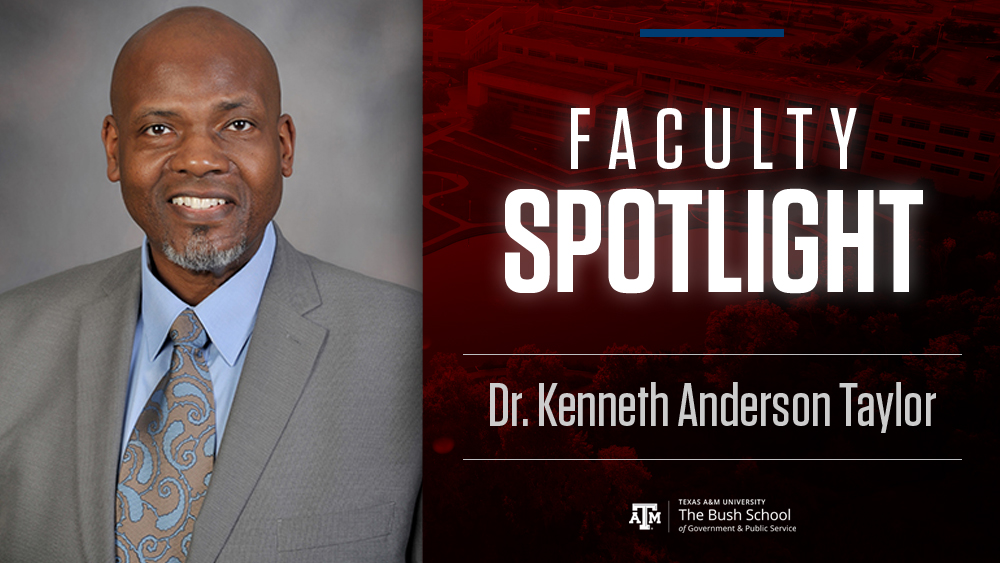
Dr. Kenneth Anderson Taylor is clear on what he hopes to accomplish at the Bush School. His focus is advancing the School’s mission of developing principled leaders for public service.
Born and raised on the south side of Chicago, without a father until his mother remarried when he was nearly a teenager, Dr. Taylor is sure that experience contributed to his desire to assist youth as an adult. “When an undergraduate student, all I knew is I wanted to help children that grow up like I did.” This led him to work toward becoming a social worker, and he realized that goal when he went to work for Big Brothers Big Sisters in 1996. In reflecting on his twelve-year career with this nonprofit, the largest youth mentoring organization in the world, he believes it provided an avenue to helping children in similar situations, and he could not have thought of a more satisfying profession at the time.
After progressing to the position of CEO of Big Brothers Big Sisters in Austin, Texas, Dr. Taylor began to think about his next journey. “I knew I wanted to do something different, but I also didn’t want my experience in the nonprofit sector to go waste.” It didn’t take long for him to decide on higher education. He had always admired several of his former professors who helped guide him and also knew (if he made it) higher education potentially provided the opportunity to advocate for public service as a career option for students.
Just like anyone else attempting to plot out a new career, Dr. Taylor identified the best nonprofit programs in higher education, and the Bush School immediately made it to the top of his list. “My path here wasn’t easy. Over the course of several years, I taught at an HBCU (a historically Black college/university), a two-year college, and a small teaching university in western Kentucky.” Since landing at the Bush School as an Assistant Professor of the Practice, working with students who already have the intent to serve others in some capacity has made his arrival that much more special.
According to Dr. Taylor, his original thought of wanting to advocate to students for careers in public service as a viable profession is “nothing” compared to already being in such an environment. In addition to spending time with students and encouraging them in the public service direction, his interactions with students are focused on sharpening their hard skills and deepening their personal leadership capacity. As for his tips to students in terms of what subsector they should considering pursuing, he first advises them to reflect on to what extent they are willing to put others’ needs ahead of their own. “Public service isn’t for everyone, so this is a fair question for students to routinely consider.” From there, he compares public service to donors who give to charitable causes they have personally been affected by and advises students to reflect on their life experiences when deciding where to work in the public or nonprofit sector. He believes students can never go wrong seeking advice from those they desire to emulate.
Dr. Taylor is trained as a leadership behaviorist and conducted his dissertation research exclusively within nonprofits. His transition out of the nonprofit sector into academia coincided with what many researchers coined the nonprofit leadership deficit—which raises questions about where tomorrow’s nonprofit talent will come from. Follow-up studies regarding this issue have now indicated talent already exists at nonprofits, but there is a lack of leadership development within the nonprofit sector, and employees simply don’t hang around long enough to advance in their careers. Having investigated the link between leader behavior within nonprofit organizations and employee job satisfaction, Dr. Taylor’s research supports the idea that nonprofit leaders who employ good leadership behaviors tend to fend off turnover because of dissatisfaction with pay and opportunities for promotion, which are two areas commonly cited as reasons nonprofit employees move on.
Dr. Taylor’s primary faculty responsibilities encompass supervising capstone seminars and teaching grant management and leadership theory courses. He is currently developing a series of online continuing education leadership courses for nonprofit professionals. Whether students who take his courses or those he advises, his goal is to challenge them with real-world scenarios with the hope that this enriches their educational experience and comes in handy when they work with or lead others.
Dr. Taylor was recently appointed a Faculty Fellow within the College of Architecture’s Center for Health Systems & Design, has been a Diversity Fellowship Reviewer for TAMU’s Office of Graduate and Professional Studies, and is the advisor for the Nu Delta Delta Undergraduate Chapter of Omega Psi Phi Fraternity, Inc., the organization he pledged as an undergraduate student and is now a proud lifetime member of. More personally, Dr. Taylor is an admirer of art and learned to quilt from his mother, enjoys hunting for antiques, and is a self-proclaimed classic car guy.
